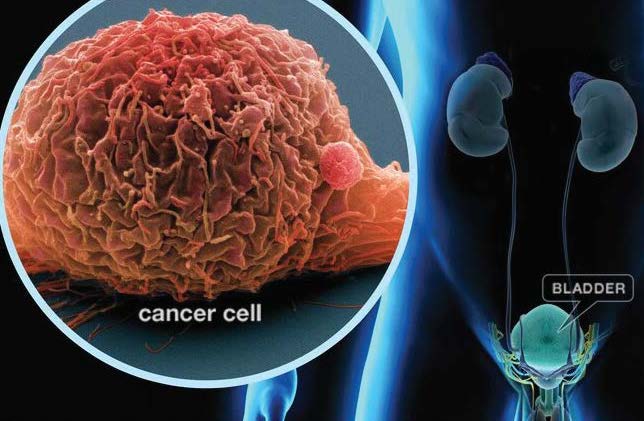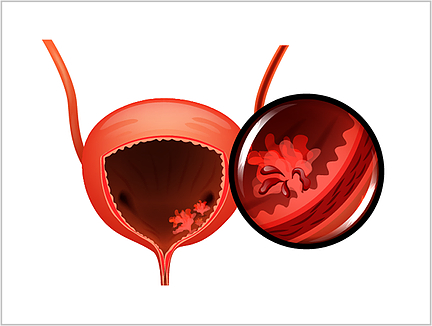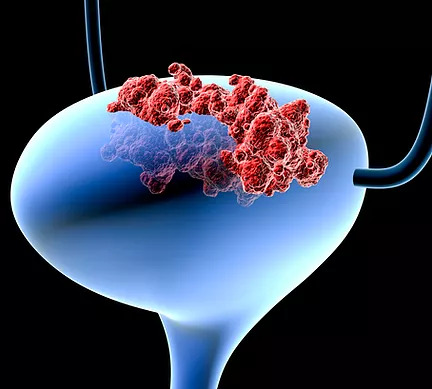Condition:
Bladder Cancer24th July

Your body is made up of tiny 'building blocks' called cells that repair and reproduce themselves in a controlled manner when other cells become damaged or die. If for some reason the cells divide and reproduce in an uncontrolled manner, resulting in more cells being made than are dying, they form into lumps. It is these lumps that are called tumours.
Tumours can be benign or malignant. Benign tumours grow but do not spread and therefore cause little trouble to the individual. Malignant tumours (or cancerous tumours) grow but also spread, often invading the surrounding tissues or structures. Sometimes cancer cells can break away from the original site and settle in other parts of the body where they may cause further damage. If this happens, the cancerous tumours that then develop are called 'secondaries' or 'metastases'.
Bladder Cancer Symptoms
The most common symptoms include:
- Haematuria (Blood in the urine) - This will usually happen suddenly and painlessly and may come and go. Sometimes you can not see the blood in your urine but it can be picked up on a routine urine test.
- Bladder changes - Bladder irritation may cause a feeling of burning when you void or a feeling of wanting to void often and/or urgently. These symptoms are more common with a normal infection but, if they do not settle after treatment with antibiotics, further tests may be needed. More common bladder problems such as infection or stones may cause the above symptoms and most people won't have bladder cancer.
Causes of bladder cancer
The causes of bladder cancer are not yet well understood by medical scientists. Studies have shown that cigarette smoking is a potential cause and others have noted a higher incidence in people who work in heavy industries such as chemical, printing and rubber. There is some evidence to suggest that bladder cancer is up to three times more common in men than women and that it is very rare before the age of 50.
Although it does not affect the UK, in parts of the world where bilharzia is common (a chronic parasitic bladder infection that lives in water), the incidence of bladder cancer is higher.
Other hereditary, environmental and genetic factors have also been linked to the occurrence of bladder cancer. However, no conclusive information is available. Repeated urinary tract infections and bladder or kidney stones (which can cause infection) have also been linked to bladder cancer. Similarly, the risk is increased by previous radiotherapy to the pelvic area for treating another kind of cancer and treatment with the chemotherapy drug cyclophosphamide. Ultimately, research into the causes of bladder cancer is ongoing and more will be known as new results are published.
Most bladder cancers are superficial and therefore only affect the lining of the bladder wall. However, if not diagnosed, or left untreated, they can grow and spread deeper into the muscle layer of the bladder wall.
Management Options
Assessments:
- Flexible cystoscopy
- Urine cytology
- CT imaging
Treatments options:
- TURBT (transurethral resection of bladder tumour)
- Major surgery and radiotherapy reserved for muscle invasive disease
Luts
 Locating Bladder Cancer
Locating Bladder Cancer
24th July
 Representation of Bladder Cancer
Representation of Bladder Cancer
24th July
Book an Appointment
Contact us during office hours at our clinics
Specialist Medical Clinic+350 200 49999
MidTown Medical Clinic+350 200 62222
HC Marbella Hospital+34 952 90 86 28
Or for an emergency consultation 24/7
James Allan+44 7984 292 776
Or email uscontact@theurologyclinic.gi
- LUTS
- BPH
- Prostate cancer
- Bladder cancer
- Kidney stones
- Ureteric stones
- Circumcision
- Vasectomy
- Kidney stones
- Bladder cancer
- Prostate cancer
- Enlarged prostate
- Incontinence
- Ureteric stones
- Circumcision
- Vasectomy
